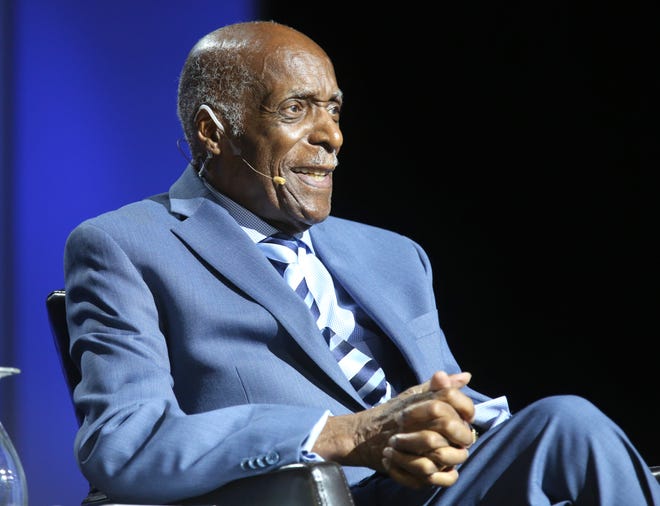When I was a young lawyer in a large law firm, the first African-American to work there, I was assigned to handle a workers compensation case for a corporate client. The employee had a strong case but the company president was adamant about fighting it, so I represented the company in its hearing before the Bureau of Workers Compensation. After the Bureau ruled (correctly) for the employee, I returned to the office to call the client, give him the news and discuss a possible appeal.
When I told him of the decision, the company president (who had never laid eyes on me) blew up and yelled into my ear, “That guy is a dirty lying NIGGER!” I was stunned. “Excuse me?” I stammered. “He’s a dirty lying NIGGER! And everybody at the Bureau is a bunch of nigger lovers. I hope they all end up with nigger grandchildren!”
I felt like I had been punched in the chest and I didn’t know what to do. So I put him on hold and just sat there for a minute, heart pounding, as I tried to swallow and catch my breath.
Then I told myself, “Just get him off the phone, tell the firm and let them handle it.” So I picked the phone back up, told him I needed to call him back and clicked off. I went upstairs to the office of the senior partner responsible for the client where, shaking and nearly in tears, I told him what happened.
He looked at me for a few seconds, then leaned back in his chair and burst out laughing.
“That guy! He’s such an old curmudgeon. Just last week, he had Bob (another partner) all worked up by giving him the business about being an Ivy Leaguer! That’s just what he does.”
Stunned, I tried to explain to him that the client hadn’t made fun of where I attended college. That this was much different.
“Don’t let it get to you kid. It’s not a big deal. You need grow a thicker skin.”
I left his office and returned to my desk, where I sat not knowing what to do next. A few minutes later, the partner came to my office.
“Oh, good, I thought. He’s figured out he needs to do something ….”
But no. He was there to get the client’s file to give to another associate to handle. “It will probably be uncomfortable for you to work with him now,” he said sympathetically, as if he was doing me a big favor by taking me off of the case.
I asked him if he was going to tell the client why a different lawyer would be working with him, hoping that he planned to stand up for me and tell the client he had insulted one of the firm’s associates.
“No. He’s old and stuck in his ways. There’s no point in embarrassing him …” And he walked out, leaving me feeling alone, unprotected and unvalued.
Most people of color, women, and, especially women of color have surely and on more than one occasion, felt exactly as I did in that moment. It’s a common experience to find ourselves attacked by outsiders and then betrayed by the people who should stick up for us but instead just shrug and tell us WE’RE making too big a deal of the whole thing.
That’s why it was such a BFD yesterday when Joe Biden warned Trump and his henchmen that if they come for Kamala Harris, they’ll have to deal with him.
“Is anyone surprised Donald Trump has a problem with a strong woman? And we know that more is to come,” he said.”So let’s be clear … Kamala Harris has had your back – and now, we have to have her back. She’s going to stand with me in this campaign, and all of us are going to stand up for her. “
When I heard those words, I nearly cried with joy and relief. So many women and minorities have had to stand alone in the face of all manner of attack without any support from the people who should be standing by our sides.
But that’s not going to happen to Kamala. Yes, she’s going to be attacked, probably worse than any woman in political history, except perhaps Hillary Clinton (who also got little support from people who should have stood up for her). It’s already started. But this time, she won’t be alone. Joe Biden has put everyone on notice that not only does he have Kamala’s back, but he expects the entire party to circle the wagons around her. He essentially said for all to hear, “She’s with US. She IS us. So if you come for her, you’d better be prepared for a fight.” And that’s a fight they do not want to have.
As VP, Joe Biden showed himself to be valued and loyal partner to America’s first black president, a younger man whom he was willing to stand behind and support unwaveringly. As a presidential candidate, he showed himself to be a champion, who learned and grew and reached out to a diverse electorate. In selecting Kamala Harris as his running mate, he showed himself to be a politically savvy, bold and sensitive leader, paying it forward and helping to dismantle yet another barrier.
And yesterday, when he put the world on notice that he has Kamala’s back and expects the rest of us to have her back, as well, Joe Biden proved himself to be an ally in the truest sense of the word, willing to wield his privilege for the greatest good.



